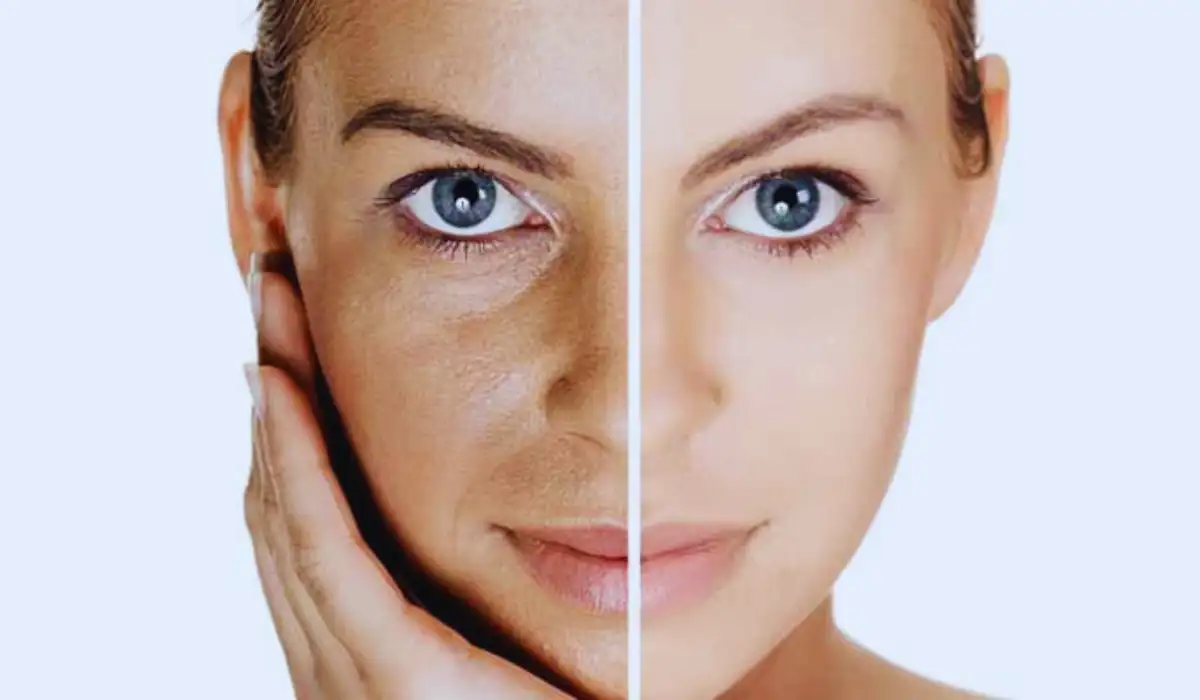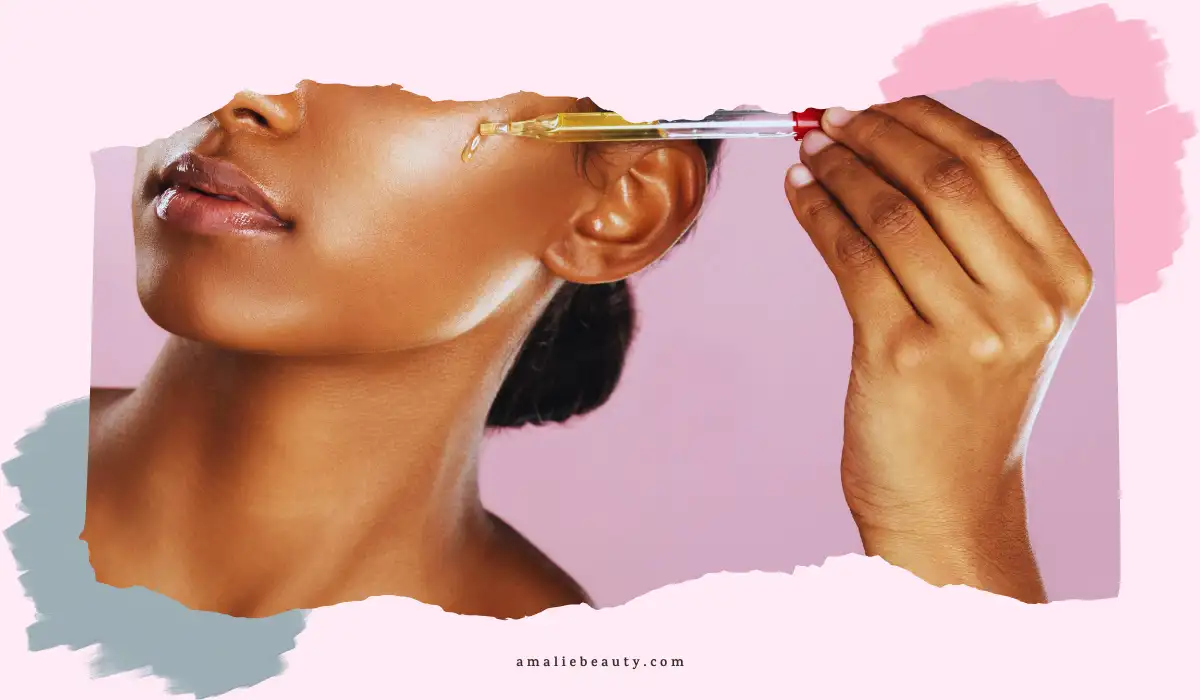The beauty sector is a place full of myths and one that has been going around for quite a long is moisturizers darken the skin.
This has led to quite many faces returning home dissatisfied because they believe that their cosmetic product has had the opposite effect on their skin from the desired one.
We will be discussing here the reasons why moisturizer makes skin dark. Check the below point for all the information you would need to know.
How do various skin conditions contribute to the phenomenon of skin darkening?

✅ Skin Type Variation
Cosmetic reactions vary widely by skin type. Different people have different skin sensitivities, including darkening. Remember that moisturizer-induced skin darkening is usually individual.
Because of skin type variation, what works for one may not work for another. Moisturizers may darken skin in some people, but this is rare.
Skin sensitivity, allergies, and health affect reactions. Ingredients one person tolerates may stain another. This stresses recognizing one’s skin’s needs and sensitivity.
Skin sensitivity to skincare products may also depend on lifestyle and environment. Personalizing skincare to sensitivities is key because what works for one may not work for all.
✅ Skin Pigmentation Disorders
Pigmentation diseases indicate a dispersion or even overproduction of an individual’s skin pigment known as melanin that causes color change.
Melasma is caused by hormonal changes and sunlight, and it manifests itself through dark spots on the face. Like hyperpigmentation, there is overproduction of melanin in some areas making them darken.
Normal moistures should be differentiated from these natural skin problems. Moisturizing lotions do not create or induce further pigmentation-related issues.
Even though moisturizers form one aspect of skin care, these cannot be blamed for severe health ailments.
✅ Hydration vs. Pigmentation in the Skin
Moisturizers are formulated, with attention to seal the moisture and hydrate the skin and not change the pigment of the skin.
Therefore when that notion says that moisturizers make us darker then it is an invalid message. Many people experience the darkening of the skin more from causes like sun exposure, genetics, and hormonal changes among others but not moisturizers.
The skin moisturizers amplify the moisture for those soft-looking, well-fed faces. The same contains hyaluronic acid and glycerine that retain moisture while retaining the integrity of the skin barrier. The same does not include elements that lead to pigmentation or that change the tone of the skin.
This helps eliminate the myth that moisturizers discolor the skin. Sunlight exposure when out in the sun is a background factor in pigmentation changes making it appear dark naturally.
The skin color also varies as a result of genetic variation and hormonal differentials. These are independent factors from moisturizers and hence reinforce the need for correcting causes of skin darkening.
✅ Lack of Exfoliation
Lack of exfoliation knowledge can make the skin darkened when moisturizer is used. Dead skin cells are removed by exfoliating moisturizers, making skin healthier and more vibrant.
It enhances texture. Exfoliating moisturizers reveal younger skin. This procedure smooths and brightens dull, uneven skin. Not darkening, exfoliation increases skin texture and brightness.
✅ Problems in Melanin Production
Melanocytes produce skin-tone-determining melanin. Sunlight, hormones, and genetics affect melanin synthesis. Moisturizers are designed to not affect pigmentation. Hydrate, moisturize and protect skin with moisturizers. Glycerine and hyaluronic acid maintain hydration without altering melanin production.
✅ Skin Sensitivity
Some people have more sensitive skin and react more to certain compounds, causing redness or irritation. Note that such sensitivity does not cause permanent skin discoloration.
Certain skincare ingredients might cause redness or irritation in sensitive skin. These responses can be caused by scents, preservatives, and other skincare components. Dispel any myths that these reactions can produce lasting skin tone changes, notwithstanding their discomfort.
Skin darkening is a worry, not skin sensitivity. Specific irritants cause momentary redness or irritation in sensitive skin, but after the irritant is removed or terminated, the skin returns to its natural state.
Skin darkening is a worry, not skin sensitivity. Specific irritants cause momentary redness or irritation in sensitive skin, but after the irritant is removed or terminated, the skin returns to its natural state.
Targeted therapies that address the fundamental cause of sensitivity-related reactions without affecting skin tone are essential.
Selecting sensitive skin products without common irritants can reduce the likelihood of unwanted reactions and improve skin health.
✅ Lifestyle Issues
Skin tone variations are often caused by lifestyle or hormonal changes. All elements must be considered to understand skin health issues.
Skin can be affected by diet, sleep, and environment. Lifelong hormonal changes might impact skin tone.
A comprehensive skincare regimen is essential. Not just moisturizers may affect things, therefore consider all contributors.
This holistic approach helps consumers comprehend skin health’s numerous elements and identify factors beyond their skincare routine.
Knowing skin tone is affected by several things enhances skin care. It encourages lifestyle, hormonal, and skin-affecting variables consideration.
This understanding dispels the notion that moisturizer use is the only explanation for skin tone differences.
Why Do Moisturizers Make Skin Dark?
Indeed, moisturizers have the power to lighten or darken skin. This occurs when the sunscreen in the moisturizer isn’t broad-spectrum, which means it can’t shield the skin from UVA and UVB rays. Also, one quality of ingredients was responsible for contributing to the skin darkening. Let’s check,
✅ Quality of Ingredients
Low-standard components decrease the efficacy of skincare products. Constituents of good moisturizers are hyaluronic acid, glycerine, and other nourishing ingredients.
However, not all moisturizers have these elements. These constituents are selected for retaining skin moisture, replenishing the skin with hydration, and reinforcing a barrier on it.
However, with improperly formulated moisturizers, people can not maintain suitable hydrations and as a result, the skin tone changes to a great level.
What Are The Solutions To Get Rid Of Dark Skin?
✅ Sunscreen in the Moisturizer is the Key
Daily skincare requires sunscreen. Sun exposure causes skin darkening, and inadequate sun protection exposes the skin to UV radiation.
Although they lack protection, moisturizers hydrate and nourish. This shortage underlines the need for complete skincare with sun protection, not moisturizers.
People who exclusively use moisturizers without sunblock risk UV damage. To solve this, the skincare program needs a broad-spectrum sunscreen. Reduces sun-induced skin discoloration by blocking UVA and UVB rays.
✅ Consultation with Dermatologists
Dermatologists must be consulted to clarify skincare product effects. Professionals can tailor advice to skin type, concerns, and medical history.
Conclusion
The above-mentioned factors are responsible for darkening the skin when you apply moisturizer.
But normally moisturizers soften the skin and keep it moistened therefore moisturizing is an essential component of healthy skin. High-quality products and daily sunscreen use are some of the secrets to beautiful and radiant skin if one knows their skin type.
So stay out of low-quality moisturizers and maintain a proper skin regime, and you can ensure proper skin fairness.

